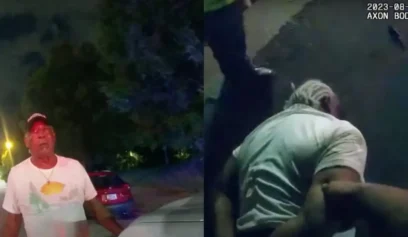Black historians and community members in Maryland pooled resources to reclaim thousands of pages documenting the auction and sale of enslaved Black Americans.
The documents, which date from the late 1600s to the early 1800s, were found in a plastic trash bag in the attic of a 200-year-old house near Chestertown, Maryland. The foundation of the house had been built in 1803 on property that had been in possession of the family since 1667.
The house, named Ripley in Queen Anne’s County, was being cleaned earlier this spring prior to its demolition. Many of the 2,000 documents discovered are business, official, or legal records, and at least 100 relate directly to Black history.
According to Nancy Bordely Lane, the owner of the home, her father told her the farm once had 500 enslaved Black people. Lane grew up in the home but part of its foundation was crumbling, she told The Washington Post. She said she was unaware of the contents of the documents, but that a friend who was helping clean the home saw them and thought they might be of value. The documents were ultimately put online for auction by Dixon’s Crumpton Auction.
When Black community members spotted the documents at the auction house 10 miles east of Chestertown, they became concerned they’d be sold out of the area, and contacted Washington College historian Adam Goodheart for his help.
“We bought every manuscript in the auction,” Goodheart said.”
The documents are now being housed at the Washington College’s Starr Center for the Study of the American Experience in Chestertown. Many of the historic pages are rare.
One piece of rag paper from 1792 describes a 20-year-old enslaved Black man named Amos as “a smart fellow” who had fled his enslaver and might be headed for his mother in Philadelphia. The reward paper is one of the oldest known.
“When I really realized what it was and that it was genuine, and how [old] it was,” Goodheart said, “there really was kind of a … moment of, ‘Wow, I’m holding something really priceless in my hands.’”
“There really aren’t any documents like this known to exist from before 1791,” he said. “And ours is one of just a tiny handful anywhere that exists from the 1700s, perhaps fewer than 10.”
The poster said, “Whoever takes up said negro and brings him home … or confines him in any [jail] so that the owner may have him again” shall receive a reward of $30, plus “reasonable charges.”
Although slavery had been outlawed in Pennsylvania in 1780, slave catchers were known to ignore that fact.
A handwritten receipt from Queen Anne’s County dated April 13, 1789, recorded the sale of an enslaved girl named Bet. According to the receipt, the girl was “about thirteen years of age.” Her buyer bought her for 40 pounds.
Not all of the documents were related to enslaved Black people. One contract documented taking over a 50-acre farm originally purchased by Solomon Willson, a free mixed-race man, in 1802.
According to Goodheart, “the documents have a kind of a sacred power.”
Goodheart initially examined the documents at the auction house and the sellers offered a five-figure price tag for the entire collection. Goodheart reached out to a variety of donors and community members. Black Washington College alumnus and trustee Norris Commodore and his wife, Terry, made a major financial contribution, and the collection has been named to honor them.
Once the collection is catalogued it will be accessible to researchers and largely available online.


